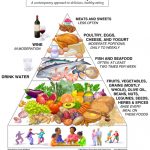Mediterranean Diet for Your Health
Category: Healthy Heart

So what is the Mediterranean Diet and why do we care? Since February is Heart Month, I thought this was an important subject, since so many of the discussions around heart disease do always come around to those heart problems being a lifestyle problem.
According to WebMD…..
There’s no single Mediterranean diet plan, but in general, you’d be eating lots of fruits and vegetables, beans and nuts, healthy grains, fish, olive oil, small amounts of meat and dairy, and red wine. This lifestyle also encourages daily exercise, sharing meals with others, and enjoying it all. Sounds good to me!
Recently published online (February 4) in the journal PLoS One, a study involving nearly 800 U.S. firefighters following a Mediterranean-style diet compared to those who did not show that this type of food did make a difference. Weight changes, cholesterol, blood pressure and blood sugar levels were followed for five years. Researchers found the more closely the men stuck to the diet, the lower their risk of developing some key markers for potential heart trouble, said Dr. Stefanos Kales, an associate professor of medicine at Harvard Medical School and Harvard School of Public Health.
Another marker, one which is definitely a risk of heart disease, stroke, and diabetes, is the metabolic syndrome. This was also compared to the groups and it was found that those who adhered most strongly to the diet had a 35% lower risk of being diagnosed with metabolic syndrome than those who followed it the least.  In study after study, the researchers said, the Mediterranean diet has been linked with better health status. Wow…..good to know. Our own family have been trying to serve fish at least once a week and also have been trying to incorporate different types of vegetables to try each night.
In study after study, the researchers said, the Mediterranean diet has been linked with better health status. Wow…..good to know. Our own family have been trying to serve fish at least once a week and also have been trying to incorporate different types of vegetables to try each night.
The Academy of Nutrition and Dietetics recommend the following dietary guidelines (which very much look like the Mediterranean diet! An additional resource that is quite helpful with guidelines on how to incorporate a “mediterranean diet” lifestyle can be found here.
- Balance calories with physical activity to manage weight
- Consume more of certain foods and nutrients such as fruits, vegetables, whole grains, fat-free and low-fat dairy products, and seafood
- Consume fewer foods with sodium (salt), saturated fats, trans fats, cholesterol, added sugars, and refined grains
One additional thing I would add to that is to add a high-grade fish oil supplement to my daily regime. Most American diets provide more than ten times as much omega-6 than omega-3 fatty acids, even though there is general scientific agreement that individuals should consume more omega-3 and less omega-6 fatty acids to promote good health. Research shows that high levels of omega-3 fatty acids promote cardiovascular health and help retain normal blood pressure and triglyceride levels.
So what is your favorite type of food? How does your daily regime of meals fit into the Mediterranean Diet? There are a lot of cookbooks on this lifestyle…my favorite is Mediterranean Light by Martha Schulman. Here is a typical Mediterranean style recipe … Enjoy!
|
Mediterranean Greek Salad
|
 |
Submitted By: Heather
Photo By: Allrecipes
|
|
3 cucumbers, seeded and sliced
1 1/2 cups crumbled feta cheese
1 cup black olives, pitted and sliced
|
3 cups diced roma tomatoes
1/3 cup diced oil packed sun-dried
tomatoes, drained, oil reserved
1/2 red onion, sliced
|
| 1. | In a large salad bowl, toss together the cucumbers, feta cheese, olives, roma tomatoes, sun-dried tomatoes, 2 tablespoons reserved sun-dried tomato oil, and red onion. Chill until serving. |
| ALL RIGHTS RESERVED © 2014 Allrecipes.com | Printed from Allrecipes.com 2/6/2014 |




Facebook Comments